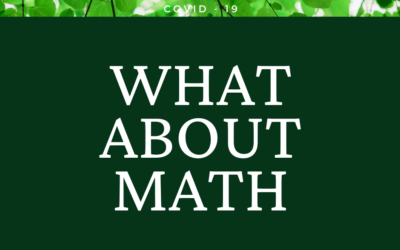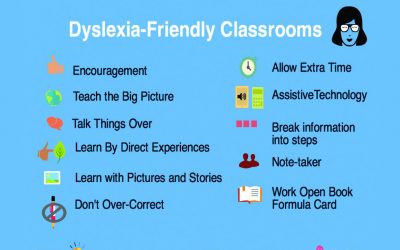With many states ordering schools to remain shut for the remainder of the school year AND the prospect fall quarter may also be waived, there are certainly going to be gaps in math education. Parents and teachers must try to make as intelligent decisions as they can...
“LIKE” Terms in Algebra Don’t Let Words Get in the Way
Many students get confused about "like" terms in Math, but it's not their fault. The terminology is confusing. Purple Math has a nice page on this post. In Algebra, "like terms" refers to terms that have the exact same variable raised to the same power. WATCH YOUTUBE...
Learning Doubles to Boost Math Facts Fluency
Learning doubles math facts can help with number flexibility. After learning how to count and "count on", doubles may be the next skill to learn. Origo Education has a nice post about how to introduce and practice doubling facts with students. First, students look for...
Dyslexia and Math: Understanding Decimals [Premium]
WHY DECIMALS ARE HARD There are many confusing aspects to decimals that are helpful to recognize when helping students. Contrary to working with whole numbers, longer sequences of numbers are not larger than shorter ones. For instance, with whole numbers, 245 is greater than 2, but .0245 is smaller than 2. For math processes involving decimals, multiplying by a decimal number between 0 and 1 is also opposite to what one might be used to. After learning that multiplication is equal groups or repeated addition, multiplying 0.3 x 0.4 = 0.12, a number that is smaller than 0.3 or 0.4. Similarly, dividing by a decimal can result in a number that is bigger than what we started out with, which can seem even more confusing. […]
PUTTING A NAME ON IT: Dyslexia, Dysgraphia, and Dyscalculia
The school year begins and then there's a lull. The first days of excitement and change are past and now teachers are trying to figure out their students and students are trying to figure out their teachers. Now is a good time for students to talk to their teachers...
MATH: The Problem of Showing Work [Premium]
If you live in a Common Core state and your student attends public school chances are they frequently are asked to “show their work”. There can be significant challenges for dyslexic students showing work because to do so requires a great deal of verbal working memory, word retrieval, executive function, and writing, all tasks that can overload each other. As with many curricula, the intentions and logic behind some of the choices seem reasonable; but also like many programs, the implementation has significant flaws so that students can become trapped in the process. Students must conform to a curriculum or fail rather than a curriculum being designed to meet the needs of students. For instance, math teachers Katherine Beals and Garry Garelick reviewed some of […]
Strategies for Addressing Math Mistakes [Premium]
Working memory mistakes in math include mistakes such as losing place in problems, errors due to missed steps or key information, calculation errors like near-misses or reversed digits, directional errors, or procedural errors like errors of grouping or carrying. In the video below, teacher Leah Alcala shares how she decided to change how she graded math mistakes in her class. Instead of putting a grade, she highlights mistakes and then gives examples of mistakes and the correct answers in class. Students have a chance to retake their test and better their final scores. This clever approach takes advantage of memory as well as intrinsic motivation and boosts what students learn in math by the time they complete her class. Working memory is such a common […]
Q: What Are the Best Tests for Dyscalculia? What About the Feifer Test?
Dyscalculia, or a math learning disability is important to identify because formal identification can qualify a student for accommodations both in the classroom and for high stakes tests. It can co-occur with dyslexia and it is under-recognized. We previously reviewed...
Your Brain on Math Anxiety [Premium]
This is your brain with math anxiety. In children as young as 7 years old, researchers found that activation in areas such as the amygdala and hippocampus were seen in children who had high math anxiety. The amydala and hippocampus are areas of the brain associated with fear condition and negative emotions. The children were given simple and complex arithmetic problems and asked to determine whether the answers given were right or wrong. The children in the high and low anxiety group were matched for IQ, working memory, reading and math performance, and general trait anxiety. As a double burden, the high math anxiety group (HMA) in the figure showed lower brain fMRI activation in areas associated with math processing. So anxiety could be acting […]
What is Dyscalculia? – Fast Facts [Premium]
“There is nothing in the IDEA that would prohibit the use of the terms dyslexia, dyscalculia, and dysgraphia in IDEA evaluation, eligibility determinations, or IEP documents.” – Michael Yudin, Department of Education “Dyscalculia is not assessed in our schools.” – school professional Fast Facts about Dyscalculia What Is Dyscalculia? Dyscalculia is usually defined as a difficulty with calculations or arithmetic skills that is not explained by low intelligence or inadequate schooling. How Common? 3-10% of people, 40% of dyslexics What Ages? Dyscalculia is lifelong, although many helpful strategies can improve math achievement. When adults with dyscalculia have calculator accommodations, they can perform at high levels in even mathematics-intense disciplines. From We Are Teachers How Do You Assess Dyscalculia? Typically dyscalculia is assessed by calculating the […]
How Do Math-Talented Dyslexics Do Calculations? [PREMIUM]
Despite the suggestion that dyslexic students who are strong in math use a different approach for doing basic mathematical operations, it’s surprising how little formal research has been done to figure out how math-gifted dyslexic individuals do what they do. At Georgetown University, neuroscience researchers were surprised to find
HOW THEY DO IT! University Students with Dyslexia [Premium]
Fortunately, there’s been growing interest from educational and scientific researchers for understanding how people can compensate for some of the academic challenges of dyslexia. POSITIVE FACTORS AMONG UNIVERSITY STUDENTS WITH DYSLEXIA A recent study by Drs. Rebecca Wiseheart and Lori Altmann (Int J Lang Comm Dis 2017) had a nice review of compensating factors as well as providing some new research data about oral fluency among college-attending dyslexic students. Background “In recent years, dyslexia has been reconceptualized as the combined sum of risk factors and protective factors. A number of protective factors have been investigated including verbal intelligence, vocabulary knowledge, morphological awareness, executive functions, and social-emotional resilience…Vocabulary knowledge has been implicated as a protective factor that allows some individuals to achieve good reading comprehension, despite […]




![Dyslexia and Math: Understanding Decimals [Premium]](https://www.dyslexicadvantage.org/wp-content/uploads/2020/02/decimals-fractions-shutterstock-400x250.jpg)

![MATH: The Problem of Showing Work [Premium]](https://www.dyslexicadvantage.org/wp-content/uploads/2020/01/April-Newsletter-MATH-the-problem-of-showing-work-400x250.jpg)
![Strategies for Addressing Math Mistakes [Premium]](https://www.dyslexicadvantage.org/wp-content/uploads/2019/08/math-dyslexia-shutterstock.png)

![Your Brain on Math Anxiety [Premium]](https://www.dyslexicadvantage.org/wp-content/uploads/2016/02/shutterstock_331750409.jpg)
![What is Dyscalculia? – Fast Facts [Premium]](https://www.dyslexicadvantage.org/wp-content/uploads/2016/02/shutterstock_172115972-math.jpg)
![How Do Math-Talented Dyslexics Do Calculations? [PREMIUM]](https://www.dyslexicadvantage.org/wp-content/uploads/2018/08/Screen-Shot-2019-08-30-at-10.17.08-AM.jpg)
![HOW THEY DO IT! University Students with Dyslexia [Premium]](https://www.dyslexicadvantage.org/wp-content/uploads/2018/08/Screen-Shot-2019-08-30-at-10.14.42-AM.jpg)













